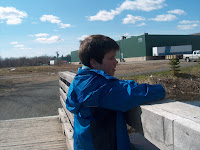
The Daily American Online of Somerset County PA is carrying a fascinating story of a high functioning autistic gentleman, Barney Vincelette, who was bothered by his neighbor's loud rock music and the steps he took to reach an accommodation with his neighbors. Many autistic persons, including my son Conor, are very sensitive to noises. There were times when I had to hold Conor on my lap while getting his hair cut. He would be so upset by the noise of shears in the barber shop that he would literally bite into my shoulder. We now pick quiet times when the shop is empty and get his hair cut, with scissors as much as possible, by a lady who is outstanding at working with Conor. Noise from motorcycles is a huge problem for Conor. Many motorbikes are adjusted to increase the sound level emitted and that is a problem for any one in the vicinity. For Conor it is a particularly difficult experience.
Autism renders sickening rock music
Tuesday, May 15, 2007 2:40 AM EDT
Barney Vincelette, who says his autism renders loud noises sickening to him, has been feuding for several years with neighbors in Houston, Del., over their rock music. At first, he invented his own sound-jammer, according to an April profile in the Wilmington News Journal, but a judge curtailed its use. Subsequently, he recorded super-annoying sounds of his own (including a fog horn's) and had them written out as music ("Sonata for Calliope of Truck Horns About to Be Transcribed for Locomotive Horns Opus No. 1"), at which point the judge decided that permitting the neighbors' Bon Jovi but not Vincelette's Sonata amounted to selective law enforcement, and the feuders settled their differences. (Vincelette, by the way, lives in a house shaped like a flying saucer.) [News Journal, 4-15-07]





































